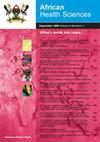Prevalence and predictors of type 2 diabetes complications: a single centre observation
IF 0.9
4区 医学
Q3 MEDICINE, GENERAL & INTERNAL
引用次数: 0
Abstract
Background: Diabetes complications are a major burden on persons living with diabetes and the health care systems. Objectives: The study assessed the glycemic control, prevalence and predictors of type 2 diabetes complications among patientsin a healthcare centre. Methods: Two hundred adults who had type 2 diabetes in a general hospital were recruited for the study. Cross-sectional andretrospective surveys were used to determine prevalence, number and types of complications in the patients. SPSS version 21was used for descriptive analysis and Chi-square (p<0.05). Results: A total of 200 (100%) respondents participated in the study and 97 (48.5%) had poor glycemic control. Mean numberof complications per patient was 2.48 ± 1.22. Number of complications per person and type of complications were significantlyassociated with Age (p = 0.000 and p = 0.000, respectively), Gender (p = 0.008 and p = 0.031, respectively) and Occupation(p=0.000 and p=0.006, respectively). Marital status (p = 0.032) and years of diagnosis (p=0.021) were also associated with typeof complications. The majority of patients 64 (32.0%) were admitted in the previous year for diabetes-related complications.Majority 159 (79.5%) had ≥ 2 number of complications from the observed 497 complications. Conclusions: Poor glycemic control and high prevalence of complications were observed. Also, socio-demographic characteristicswere likely predictors of number and type of complications. These findings are essential for improved planning andprioritizing of diabetes care. Keywords: Complications; Nigeria; prevalence; socio-demographics predictors; type 2 diabetes.2型糖尿病并发症的患病率和预测因素:单中心观察
背景:糖尿病并发症是糖尿病患者和卫生保健系统的主要负担。
目的:评估某医疗中心2型糖尿病患者的血糖控制、患病率及并发症的预测因素。方法:在一家综合医院招募了200名患有2型糖尿病的成年人进行研究。采用横断面回顾性调查来确定患者并发症的患病率、数量和类型。使用SPSS version 21进行描述性分析和卡方(p<0.05)。
结果:200人(100%)参与研究,97人(48.5%)血糖控制不良。平均并发症数为2.48±1.22例。并发症发生率、并发症类型与年龄(p=0.000、p=0.000)、性别(p= 0.008、p= 0.031)、职业(p=0.000、p=0.006)相关。婚姻状况(p= 0.032)和诊断年限(p=0.021)也与并发症类型相关。大多数患者64例(32.0%)在前一年因糖尿病相关并发症入院。在观察到的497例并发症中,159例(79.5%)并发症数≥2例。
结论:患者血糖控制不良,并发症发生率高。此外,社会人口统计学特征可能是并发症数量和类型的预测因子。这些发现对于改善糖尿病护理的规划和优先排序至关重要。关键词:并发症;尼日利亚;患病率;socio-demographics预测;2型糖尿病。
本文章由计算机程序翻译,如有差异,请以英文原文为准。
求助全文
约1分钟内获得全文
求助全文
来源期刊

African Health Sciences
MEDICINE, GENERAL & INTERNAL-
CiteScore
2.30
自引率
0.00%
发文量
179
审稿时长
>12 weeks
期刊介绍:
The African Health Sciences is an internationally refereed journal publishing original articles on research, clinical practice, public health, policy, planning, implementation and evaluation, in the health and related sciences relevant to Africa and the tropics. Its objectives are to: Advocate for and promote the growth of reading culture in sub Saharan Africa; Provide a high quality journal in which health and policy and other researchers and practitioners in the region can and world wide, can publish their work; Promote relevant health system research and publication in the region including alternative means of health care financing, the burden of and solution of health problems in marginalized urban and rural communities amongst the displaced and others affected by conflict; Promote research and the systematic collection and collation and publication of data on diseases and conditions of equity and influence; Promote development of evidence-based policies and guidelines for clinical, public health and other practitioners. African Health Sciences acknowledges support provided by the African Health Journals Partnership Project that is funded by the US National Institutes of Health (through the National Library of Medicine and the Fogarty International Center) and facilitated by the Council of Science Editors.
 求助内容:
求助内容: 应助结果提醒方式:
应助结果提醒方式:


